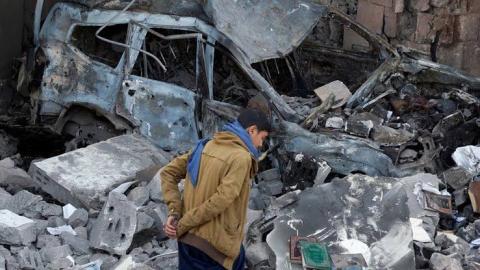No end to Yemen civil war on the horizon, senior UN official briefs Security Council


No progress has been made by parties in Yemen to reach a political agreement to settle the civil war, which is now in its seventh year, a senior UN official for the Middle East region told the Security Council on Monday.
“It is imperative to resume an inclusive, Yemeni-led political process to reach a negotiated solution to the conflict,” said Khaled Khiari, Assistant Secretary-General for Middle East, Asia and the Pacific, referring to a 2015 peace plan, which called for a nationwide ceasefire, the reopening of Sana’a airport, the easing of restrictions on fuel and goods flowing through Hudaydah port, and the resumption of face-to-face political negotiations.
Mr. Khiari said that the Houthis continue to make the opening of Hudaydah ports and Sana’a airport, as well as on the ending of what they call the “aggression and occupation”, conditions of their renewed participation in the political process.
Moreover, negotiations facilitated by Saudi Arabia on the Riyadh Agreement – which were focused on the return of the Prime Minister and other ministers to Aden – have yet to resume following the Eid break in July. Timely progress on the accord’s implementation remains vital to address the tensions in the south, he explained.
Fighting threatens main routes to Mar’ib
Meanwhile, military activity continues to ebb and flow, said Mr. Khiari, with sporadic fighting observed in Al Jawf and Taiz. Ma’rib remains the key strategic focus.
In Al Bayda, gains made by Yemeni forces supported by the Saudi-led coalition were reversed by the Houthis, who have moved towards the border between Ma’rib and Shabwa governorates, threatening the main arterial routes.
Mr. Khiari called on all parties to “completely and immediately” cease such attempts to achieve territorial gains by force.
Riyal at record low
On the economic front, he said the value of the riyal in Government-controlled areas reached a record low of 1,000 riyals to 1 United States dollar.
The Southern Transitional Council has threatened to enforce an independent local exchange rate in Aden and other areas under their control in southern Yemen, which would further complicate efforts to foster a cohesive economic recovery.
Calls to open Hudaydah port, allow entry of fuel supplies
Turning to the issue of fuel supply, Mr. Khiari said that only three commercial fuel vessels were given clearance to berth at Hudaydah port since July. Four fuel vessels remain in the coalition holding area, and all but one petrol station in Houthi-controlled governorates have reportedly closed. Cooking gas shortages have pushed wait times to one month for refilling empty cylinders.
“We reiterate our call on the Government of Yemen to urgently allow the entry of all essential commercial supplies – including fuel ships – to Hudaydah without delay,” he stressed, pressing all parties to prioritize civilian needs and abstain from “weaponizing the economy”.
Violence wreaks havoc on lives of children
Henrietta Fore, Executive Director of the United Nations International Children’s Emergency Fund (UNICEF), acknowledged that little has changed since her last briefing on the situation two years ago. “Each day, the violence and destruction wreak havoc on the lives of children and their families,” she stressed.
In 2021, 1.6 million children have been internally displaced due to violence, she said, notably in Hudaydah and Ma’rib, while essential health, sanitation and education services are “incredibly fragile” and “on the brink of total collapse”.
Gross domestic product (GDP), meanwhile, dropped 40 per cent since 2015, she continued – a major concern, as one quarter of the population – including many doctors, teachers and sanitation workers – rely on civil servant salaries, which are paid erratically, if at all.
One child dies every 10 minutes, 2 million out of school
Ms. Fore said almost 21 million – including 11.3 million children – need humanitarian assistance to survive. Some 2.3 million children are acutely malnourished and 400,000 children under age five suffer from severe acute malnutrition.
“In Yemen, one child dies every 10 minutes from preventable causes, including malnutrition and vaccine-preventable diseases,” she stressed.
Two million children are out of school and one in six schools can no longer be used. Two-thirds of teachers – over 170,000 of them – have not received a regular salary for four years, due to the conflict, placing 4 million additional children at risk of dropping out, as unpaid teachers quit to find other ways of providing for their families.
Being a child in Yemen is ‘the stuff of nightmares’
The UNICEF chief said that she and her colleagues are deeply worried that the numbers do not adequately reveal what children in Yemen experience, from watching parents struggle to fight off starvation, to being killed by a bullet, explosion or landmine, recruited to join the war or forced into marriage.

Yemeni officials on Monday condemned arrests and prosecutions by the Iran-backed Houthi militia directed against media, journalists and celebrities…

Yemen's warring parties are gearing up for new waves of conflict in 2023 amid a lack of decisive steps towards sustainable peace, adding to the suf…

The UAE will help to recruit doctors and deliver crucial supplies for hospitals in Yemen under a major healthcare drive. The Khalifa bin…